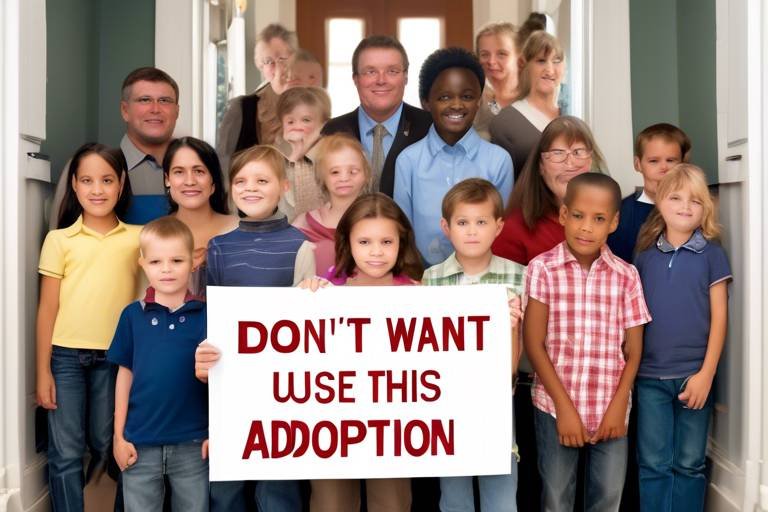How to Address Adoption Myths in Your Community
Adoption is a beautiful journey that creates families and changes lives, yet it’s often shrouded in misconceptions and myths. These misunderstandings can lead to stigma and a lack of acceptance in our communities. So, how do we tackle these myths head-on? The first step is education. By sharing accurate information and personal stories, we can foster a deeper understanding of adoption and its profound impact on families. This article will explore common myths surrounding adoption and provide insights into how we can promote acceptance and understanding in our communities.
Adoption myths can create stigma and misunderstanding. These myths often arise from a lack of knowledge or personal experience with adoption. For instance, many people may not realize that adoption is a valid and loving choice made by birth parents. Others might mistakenly believe that adopted children are inherently troubled or unwanted. These misconceptions persist in society, perpetuated by media portrayals and outdated beliefs. Addressing these myths is crucial for healthier community perceptions and for creating a supportive environment for all families.
One of the most damaging misconceptions about adoption is the belief that adopted children are unwanted. This idea is not only incorrect but also deeply hurtful. In reality, many birth parents make the incredibly difficult decision to place their child for adoption out of love and a desire for the best future for their child. It's essential to recognize that adoption often stems from circumstances that are beyond the parents' control, such as financial hardship, health issues, or personal situations that make parenting challenging.
Birth parents are often portrayed negatively in discussions about adoption, leading to a pervasive myth that they simply don’t care about their children. However, the truth is quite the opposite. Many birth parents choose adoption because they want their child to have the best possible life. They may feel that they cannot provide the necessary resources or stability, and in their hearts, they believe that placing their child for adoption is the most loving choice. Understanding this perspective is crucial in dismantling the stigma surrounding adoption.
Adoption is not just a last resort; it is a positive and loving option for many families. It creates opportunities for children to grow up in nurturing environments filled with love and support. The benefits of adoption extend beyond the child; birth parents often find peace in knowing their child is loved and cared for, while adoptive families gain the joy of expanding their family. By emphasizing the positive aspects of adoption, we can counter the myth of unworthiness and promote a more accurate narrative about what it means to adopt.
Another common myth is that adoptive parents may not be as capable or qualified as biological parents. This stereotype undermines the dedication and love that adoptive parents bring to their families. In reality, adoptive parents undergo extensive processes to ensure they are prepared for the challenges of raising a child. They often face rigorous assessments and training designed to equip them with the skills necessary to provide a loving and supportive environment for their children.
Adoptive parents frequently have access to specialized training and support networks. These resources are designed to help them navigate the unique challenges that can arise in adoption situations. From understanding the emotional needs of adopted children to learning about the importance of maintaining a connection with their child's heritage, adoptive parents are well-prepared to create a nurturing home. This commitment to education and support showcases their dedication to being excellent parents.
Sharing real-life success stories of adoptive families can be a powerful way to dispel myths. Testimonials from adoptive parents who have built loving, stable families illustrate the profound impact they have on their children's lives. These stories highlight the joy, challenges, and triumphs that come with adoption, providing a more nuanced understanding of what it means to be an adoptive family. By amplifying these voices, we can shift perceptions and inspire others to embrace the beauty of adoption.
Adoption is often mistakenly viewed as a last resort, a choice made only when all other options have failed. This perspective diminishes the validity of adoption as a family-building option. In reality, families may choose adoption for a variety of reasons, including infertility, personal circumstances, or a desire to provide a loving home to a child in need. By recognizing that adoption is a deliberate and empowering choice, we can challenge the stigma associated with it.
Families may choose adoption for numerous reasons, including infertility or personal circumstances. For many, the decision to adopt is driven by a deep desire to love and nurture a child. This choice is often made after careful consideration and is rooted in the belief that every child deserves a loving family. Understanding the motivations behind adoption can help shift the narrative from one of desperation to one of hope and love.
The outcomes of adoption can be incredibly positive for all involved. Adopted children often thrive in stable, loving environments, benefiting emotionally, socially, and psychologically. Adoptive families gain not just children, but also the joy of watching them grow, learn, and succeed. By focusing on these positive outcomes, we can create a more supportive and accepting community for all families, regardless of how they are formed.
- What are some common myths about adoption? Many myths include the belief that adopted children are unwanted, that adoptive parents are less qualified, and that adoption is a last resort.
- How can I help address these myths in my community? You can help by sharing accurate information, personal stories, and supporting local adoption organizations.
- What resources are available for adoptive parents? Adoptive parents have access to training programs, support groups, and counseling services to help them navigate the adoption process.

Understanding Adoption Myths
Adoption myths can create stigma and misunderstanding, casting a shadow over what is often a beautiful and loving journey. These myths are not just harmless misconceptions; they can lead to negative perceptions that affect how society views adopted children and their families. So, why do these myths persist? Well, it's a combination of misinformation, societal norms, and a lack of open dialogue about adoption. In many communities, adoption is still shrouded in mystery, which fosters a breeding ground for myths.
To truly understand the impact of these myths, we need to address a few key points. First, many people believe that adopted children come from broken homes or are unwanted. This damaging belief overlooks the reality that adoption is often a choice made with deep love and care. Birth parents, in many cases, make the heart-wrenching decision to place their child for adoption not because they don't want them, but because they want what's best for them.
Another common myth is that adoptive parents are somehow less qualified than biological parents. This notion not only undermines the dedication of adoptive families but also ignores the rigorous processes they undergo to become parents. Adoptive parents often receive extensive training and support, equipping them with the tools they need to provide a loving and stable home.
Lastly, many people view adoption as a last resort, a decision made only when all other options have failed. This perspective is not only limiting but also fails to recognize the myriad reasons families choose adoption. From infertility to the desire to provide a loving home to a child in need, adoption can be a first-choice option for many families.
By addressing these myths head-on, we can foster a healthier understanding of adoption in our communities. It's essential to engage in informed discussions, share personal stories, and promote acceptance of diverse family structures. The more we talk about adoption openly, the more we can dismantle harmful stereotypes and create a supportive environment for all families, regardless of how they are formed.

Myth 1: Adopted Children Are Unwanted
One of the most damaging myths surrounding adoption is the belief that adopted children are unwanted. This misconception can create a stigma that not only affects the children themselves but also the families that choose to adopt. In reality, the circumstances that lead to adoption are often complex and deeply rooted in love and care. Many birth parents make the heart-wrenching decision to place their child for adoption because they want what is best for their child, often in situations where they feel unable to provide the necessary resources or environment for their child's growth. This belief that adopted children are unwanted can overshadow the truth: that adoption is frequently a loving and intentional choice.
When we talk about adoption, we need to emphasize that it is not a reflection of a child's worth or desirability. Instead, it is important to recognize the profound love that exists in the decision-making process. Birth parents may face various challenges—financial instability, health issues, or personal circumstances—that lead them to believe that adoption is the best option for their child. They often hope for a brighter future for their children, and this hope drives their decision to place the child in the care of loving adoptive families.
Moreover, the narrative around adoption can be enriched by sharing stories that illuminate the realities of adopted children's lives. For instance, many adopted children grow up in nurturing environments filled with love, support, and opportunities. They are not just the result of a choice made out of necessity; they are cherished members of their adoptive families. To further combat this myth, we can look at some key points:
- Adoption is a choice made with love: Birth parents often choose adoption to ensure their child has a better life.
- Adopted children are loved: Adoptive families embrace these children with open arms, providing them with a stable and nurturing environment.
- Positive outcomes: Many studies show that adopted children thrive in loving homes and lead fulfilling lives.
By addressing the myth that adopted children are unwanted, we can foster a more compassionate understanding of the adoption process. It's essential to shift the narrative from one of stigma to one of hope and love. Every child deserves a family, and every family deserves to be recognized for the love they provide, regardless of how they were formed. In doing so, we not only uplift adopted children and their families but also contribute to a more inclusive society that values diverse family structures.
The Truth About Birth Parents
When it comes to the topic of adoption, one of the most significant misconceptions is the perception of birth parents. Many people imagine birth parents as individuals who simply do not want their children, but this could not be further from the truth. In reality, the decision to place a child for adoption is often one of the most heart-wrenching choices a parent can make, driven by love, care, and a desire for the best future for their child. Birth parents may be facing a variety of challenges, including financial instability, health issues, or personal circumstances that make parenting difficult. Rather than being a reflection of unworthiness, their choice is often a profound act of selflessness.
It's essential to recognize that birth parents come from all walks of life. They may be young parents who are not yet ready for the responsibilities of parenthood, or they may be individuals who have faced unexpected life challenges. Some birth parents may already have children and feel that they cannot provide adequately for another. In these situations, adoption is seen as a loving choice, ensuring that their child has the opportunity for a stable and nurturing environment. The decision is rarely made lightly; it involves careful consideration and often a lot of emotional turmoil.
Moreover, birth parents often have hopes and dreams for their children that extend beyond their own circumstances. They may wish for their child to have access to better education, healthcare, or opportunities that they feel unable to provide. This motivation is a testament to their love and commitment to the well-being of their child. It's important to understand that many birth parents maintain a desire for openness and connection with their children, and some even choose to have ongoing relationships with adoptive families.
To further illustrate the diverse realities of birth parents, here are some common reasons that lead to the decision to place a child for adoption:
- Financial Constraints: Many birth parents feel they cannot provide the necessary financial support for a child.
- Health Issues: Physical or mental health challenges can impact a parent's ability to care for a child.
- Young Age: Teen parents may realize they are not ready for the responsibilities that come with parenting.
- Desire for a Better Future: Some parents may believe that adoption will provide their child with better opportunities.
Understanding the truth about birth parents is crucial in dismantling the stigma surrounding adoption. When we embrace the realities of their experiences and motivations, we foster a more compassionate and informed community. By sharing stories and insights, we can help others recognize that adoption is not about abandonment; it is about love, sacrifice, and the hope for a brighter future.
Q1: Why do birth parents choose adoption?
A1: Birth parents often choose adoption due to various reasons, including financial instability, personal circumstances, or a desire to provide their child with better opportunities than they can offer.
Q2: Do birth parents regret their decision?
A2: While some birth parents may experience feelings of loss or regret, many find peace in their decision, knowing it was made out of love for their child.
Q3: Can birth parents have contact with their child after adoption?
A3: Yes, many adoptive families and birth parents choose to have open adoptions, allowing for ongoing contact and relationships.
Adoption as a Loving Option
When we think about adoption, it’s easy to get caught up in the misconceptions that cloud our understanding. However, adoption is not just a solution to a problem; it is a loving choice made by many families. It’s essential to recognize that adoption can be a beautiful path to family creation, filled with love, hope, and endless possibilities. For many, the decision to adopt comes from a deep desire to provide a child with a nurturing environment, regardless of the circumstances that led to the adoption.
Adoptive families often embody a unique blend of dedication and compassion. They are individuals who have chosen to open their hearts and homes to children who need a family. The reality is that many birth parents, faced with challenging circumstances, make the heart-wrenching decision to place their child for adoption out of an overwhelming sense of love and care. They want the best for their child, and sometimes that means finding a family that can provide the stability and resources that they cannot.
Moreover, adoption can be a mutually beneficial arrangement for both the child and the adoptive family. Children placed for adoption often thrive in loving environments where they receive the attention and care they need to flourish. Adoptive parents frequently report that their lives are enriched in ways they never anticipated. They gain not only a child but also a profound sense of purpose and fulfillment. The love that grows within an adoptive family is just as real and strong as that found in biological families.
In many cases, adoption can also help break the cycle of trauma. Children who may have faced instability or hardship in their early lives can find a safe haven in an adoptive family. This new environment allows them to heal and grow, leading to positive emotional and psychological outcomes. It’s not just about providing a home; it’s about creating a nurturing space where a child can thrive. The love that develops in these families is a testament to the resilience of the human spirit.
To further illustrate the positive aspects of adoption, consider the following table that highlights some of the key benefits for children, birth parents, and adoptive families:
| Group | Benefits |
|---|---|
| Children |
|
| Birth Parents |
|
| Adoptive Families |
|
In conclusion, adoption is a loving option that can transform lives. It’s a choice filled with hope, love, and the promise of a brighter future for all involved. By addressing the myths surrounding adoption, we can foster a deeper understanding and appreciation for the diverse family structures that exist in our communities. Let’s celebrate the love that adoption brings and support those who choose this beautiful path.
Here are some common questions about adoption that can help clarify any lingering doubts:
- What is the process of adoption? The adoption process varies by location and type of adoption, but generally involves home studies, background checks, and legal proceedings.
- Can birth parents maintain contact with their child? In many cases, yes! Open adoptions allow for varying degrees of contact between birth parents and adoptive families.
- Are adopted children different from biological children? No, children are children. Love, care, and attention are what truly matter in raising happy and healthy kids.
- What resources are available for adoptive families? There are numerous support groups, training programs, and counseling services available to help adoptive families navigate their journey.

Myth 2: Adoptive Parents Are Less Qualified
One of the most persistent myths surrounding adoption is the belief that adoptive parents are somehow less qualified than biological parents. This misconception not only undermines the dedication and love that adoptive parents bring to their families but also perpetuates stigma that can impact both children and families involved in the adoption process. The truth is, adoptive parents undergo rigorous assessments and training, ensuring they are not only capable but often exceptionally prepared to provide nurturing and stable environments for their children.
Before being approved, potential adoptive parents must navigate a comprehensive process that includes home studies, background checks, and interviews. This thorough vetting process is designed to ensure that children are placed in homes where they will be safe, supported, and loved. Contrary to popular belief, the qualifications of adoptive parents can often exceed those of biological parents, as they have to demonstrate their commitment and readiness to embrace the challenges that come with adoption.
Furthermore, many adoptive parents seek out specialized training programs that equip them with the skills necessary to handle the unique needs of adopted children. These programs often cover topics such as:
- Understanding attachment issues
- Addressing trauma and loss
- Building trust and communication
This proactive approach not only enhances the adoptive parents' capabilities but also fosters a deeper understanding of their child's background, which is crucial for creating a supportive family dynamic.
Real-life success stories abound, showcasing the incredible journeys of adoptive families that challenge the notion of less qualification. For instance, consider the story of the Johnsons, who adopted two siblings from foster care. Through their journey, they learned essential parenting skills and created a loving home that helped their children thrive academically and socially. Their experience is a testament to the fact that love, commitment, and the willingness to learn are what truly define a qualified parent.
In conclusion, the myth that adoptive parents are less qualified is not only unfounded but also harmful. By recognizing the extensive preparation and dedication that these parents demonstrate, we can begin to dismantle this stereotype and appreciate the diverse family structures that enrich our communities.
- What qualifications do adoptive parents need? Adoptive parents typically need to undergo a home study, background checks, and demonstrate financial stability, emotional readiness, and a supportive environment for the child.
- Are there resources available for adoptive parents? Yes, many organizations offer training, support groups, and educational resources tailored specifically for adoptive families.
- Can adoptive parents receive financial assistance? Many states provide financial assistance to help offset the costs of adoption and the ongoing needs of adopted children.
Training and Support for Adoptive Parents
Adoption is a beautiful journey, but it’s also one that comes with its unique set of challenges. That’s where training and support for adoptive parents come into play. Many people might not realize that adoptive parents are not just thrown into the deep end; they are equipped with the tools and resources they need to succeed. This preparation is crucial because it ensures that they are ready to provide a loving and stable environment for their children.
One of the key components of this training is the pre-adoption education. This education covers a wide range of topics, including the emotional needs of adopted children, the importance of maintaining connections with birth families, and understanding the potential challenges that may arise. For instance, adoptive parents learn about the impact of trauma and loss on children and how to support their emotional well-being. This knowledge is invaluable, as it helps parents approach their parenting with empathy and understanding.
In addition to pre-adoption training, many agencies and organizations offer ongoing support through post-adoption services. These services might include counseling, support groups, and workshops that focus on specific issues such as attachment, behavioral challenges, and navigating the complexities of adoption. Having access to these resources can make a significant difference in the lives of adoptive families, providing them with a community of support and understanding.
Moreover, adoptive parents often find strength in connecting with others who have walked a similar path. Support groups can be a lifeline, offering a space for parents to share their experiences, challenges, and triumphs. The camaraderie found in these groups fosters a sense of belonging and reassurance, helping to dispel feelings of isolation that can sometimes accompany the adoption journey.
To further illustrate the importance of training and support, consider the following table that outlines some common training topics and the benefits they provide:
| Training Topic | Benefits |
|---|---|
| Understanding Trauma | Helps parents recognize and address the emotional needs of their child. |
| Attachment Strategies | Equips parents with techniques to foster a secure attachment with their child. |
| Open Adoption Dynamics | Educates parents on the benefits and challenges of maintaining contact with birth families. |
| Behavior Management | Provides tools for addressing behavioral issues effectively and compassionately. |
In summary, the training and support available to adoptive parents are not just beneficial; they are essential. By investing time and resources into preparation and community, adoptive parents can create a nurturing environment that allows their children to thrive. The journey of adoption is filled with love and hope, and with the right support, families can navigate it successfully.
- What kind of training do adoptive parents receive? Adoptive parents typically receive training on topics like trauma, attachment, and behavior management to prepare them for their parenting journey.
- Are there support groups available for adoptive families? Yes, many organizations offer support groups where adoptive parents can connect, share experiences, and find community.
- How can training impact the adoption experience? Proper training helps parents understand their child's needs better, fostering a more supportive and loving environment.
Real-Life Success Stories
When it comes to adoption, the narratives that echo through the hearts of families are often filled with joy, resilience, and love. These serve as powerful testaments to the beauty of adoption, countering the myths and misconceptions that can cloud public perception. For instance, take the story of the Johnson family, who struggled with infertility for years. After countless treatments and heartaches, they decided to explore adoption. They welcomed a beautiful baby girl into their home, and today, she is the light of their lives. The Johnsons often speak about how adopting their daughter was not just a solution to their struggles but a transformative experience that enriched their family beyond measure.
Another inspiring example is the Rodriguez family, who adopted two siblings from the foster care system. They were initially concerned about the challenges of adopting older children, but they quickly discovered the deep bonds that formed through love and understanding. The siblings, once feeling lost and alone, now thrive in a nurturing environment where they are encouraged to pursue their dreams. The Rodriguez family emphasizes that adoption is not merely about creating a family; it's about building lasting relationships that foster growth and happiness.
These stories illustrate that adoption can lead to profound connections and a sense of belonging. It's essential to highlight that every adoption journey is unique, with its own set of challenges and rewards. Many adoptive families report feeling a deep sense of purpose and fulfillment, knowing they have provided a loving home to a child in need. In fact, a recent survey indicated that approximately 85% of adoptive parents feel a strong emotional bond with their adopted children, often describing their families as "complete" after the adoption process.
Moreover, the impact of adoption extends beyond just the families involved. Communities that embrace and support adoption create a ripple effect of acceptance and understanding. By sharing these success stories, we can encourage others to rethink their perceptions of adoption. It's not just about filling a void; it's about creating a tapestry of love that enriches lives and fosters connection.
In summary, real-life success stories of adoptive families serve as an antidote to the myths surrounding adoption. They remind us that every child deserves a loving home, and every family can be made whole through the gift of adoption. As we continue to share these narratives, we pave the way for a more inclusive society that celebrates diverse family structures.
- What are the common misconceptions about adoption? Many people believe that adopted children are unwanted or that adoptive parents are less qualified. These myths can create stigma and misunderstanding.
- How can I support adoptive families in my community? You can support adoptive families by educating yourself about adoption, advocating for acceptance, and offering your help when needed.
- What resources are available for adoptive parents? There are numerous resources available, including support groups, training programs, and informational websites that provide guidance and community.
- Are there different types of adoption? Yes, there are several types of adoption, including domestic, international, and foster care adoption, each with its own processes and regulations.

Myth 3: Adoption Is a Last Resort
When it comes to adoption, there's a pervasive myth that it is merely a last resort for families who have exhausted all other options. This notion couldn't be further from the truth. In reality, many families actively choose adoption as a valid and enriching way to build their families. Just like choosing to plant a garden, where you select the seeds that will flourish best in your unique environment, families may find that adoption aligns perfectly with their hopes and dreams.
There are numerous reasons why families may choose adoption, and these motivations are as diverse as the families themselves. For some, it may stem from struggles with infertility or the desire to provide a loving home to a child in need. Others might find themselves in circumstances where adoption feels like the most loving choice for their child. The choice to adopt is often made with deep consideration and a heart full of love, rather than a sense of defeat or desperation.
In fact, adoption can be a positive and empowering experience for everyone involved. It opens doors to new possibilities and creates opportunities for children to thrive in nurturing environments. Consider the following reasons why families choose adoption:
- Infertility: Many couples face challenges in conceiving naturally, leading them to explore adoption as a fulfilling alternative.
- Desire to Help: Some families are motivated by the desire to provide a stable and loving home for children who may not otherwise have one.
- Personal Circumstances: Life situations, such as health issues or financial constraints, may lead birth parents to consider adoption as the best option for their child.
Moreover, the outcomes of adoption can be incredibly positive, not just for the children but also for the adoptive families. The emotional bonds formed through adoption can be just as strong, if not stronger, than those formed through biological ties. Adoptive parents often find themselves deeply connected to their children, sharing experiences, love, and support that foster a sense of belonging.
To illustrate the positive impact of adoption, let's look at some of the benefits:
| Benefit | Description |
|---|---|
| Emotional Fulfillment | Adoptive families often experience a profound sense of joy and purpose in their roles as parents. |
| Stable Environment | Children in adoptive families are provided with a safe and nurturing environment that promotes healthy development. |
| Diverse Family Structures | Adoption enriches the community by showcasing the beauty of diverse family dynamics. |
In essence, viewing adoption as merely a last resort diminishes the rich tapestry of experiences and choices that families make. Adoption is a journey filled with love, hope, and the promise of a brighter future. By understanding and addressing this myth, we can foster a more inclusive and accepting community that celebrates all forms of family.
Q: Is adoption only for families who cannot have biological children?
A: No, adoption is a choice for many families, regardless of their ability to have biological children. It is a way to provide a loving home to a child in need.
Q: Are adopted children less likely to be successful?
A: Research shows that adopted children can thrive in loving environments just like their peers. Success is determined by the support and resources provided by the family.
Q: Can birth parents change their mind after placing a child for adoption?
A: In many cases, birth parents have a legal time frame to change their minds, but this varies by state and the type of adoption. It's important to consult with professionals during this process.
Choosing Adoption for Various Reasons
When it comes to the decision to adopt, families often have a multitude of reasons that lead them down this beautiful path. It's essential to understand that adoption is not merely a fallback option; rather, it is a thoughtful and intentional choice made by loving families. Many prospective parents embark on this journey due to personal circumstances that make traditional parenting challenging or unfeasible. For instance, couples facing infertility may find adoption to be a fulfilling alternative that allows them to experience the joys of parenthood without the biological route.
Moreover, some families may choose adoption due to a desire to provide a loving home to children in need. This altruistic motivation often stems from a deep-seated belief that every child deserves a family, regardless of their background or circumstances. The decision to adopt can be influenced by various factors, including:
- Infertility: Many couples struggle with infertility and, after exploring various options, find that adoption offers a path to parenthood.
- Personal Circumstances: Life events such as health issues, age, or financial constraints may lead individuals or couples to consider adoption.
- Desire to Help: Some individuals feel a calling to help children who are in foster care or who need a stable family environment.
In addition to these factors, societal shifts have also contributed to the growing acceptance of adoption as a valid family-building option. As we witness a broader understanding of family structures, more people recognize that love and commitment are what truly define a family, not just biological connections. This evolving perspective encourages families to embrace adoption as a legitimate and beautiful way to expand their households.
Ultimately, the decision to adopt is a deeply personal one, shaped by individual experiences, values, and dreams. It’s crucial to acknowledge that adoption can lead to incredible outcomes for all parties involved, offering children a nurturing environment and parents the opportunity to experience the joys of raising a child. The emotional rewards of adoption often extend far beyond the initial choice, creating bonds that can last a lifetime.
Q: What are some common reasons people choose to adopt?
A: People choose to adopt for various reasons, including infertility, personal circumstances, and a desire to provide a loving home to a child in need.
Q: Is adoption a last resort?
A: No, adoption is a valid family-building option and is often a thoughtful choice made by families looking to expand their homes.
Q: How can I learn more about the adoption process?
A: Many resources are available, including local adoption agencies, support groups, and online forums where you can connect with other adoptive families.
Positive Outcomes of Adoption
Adoption is not just a solution; it’s a transformative journey that can yield incredible positive outcomes for everyone involved. When we think about adoption, we often focus on the challenges, but it’s essential to shift our perspective and highlight the numerous benefits that can arise from this beautiful act of love. For children, adoption can provide a stable and nurturing environment, which is crucial for their emotional and psychological development. Many adopted children thrive in families that offer them love, security, and a sense of belonging, which they might not have experienced otherwise.
Moreover, the emotional bonds formed between adoptive parents and their children can be just as strong as those in biological families. Studies have shown that children who are adopted often develop healthy attachments and relationships, which are vital for their overall well-being. When adoptive parents invest time and energy into creating a supportive home, the results can be life-changing. Children not only gain a family but also access to opportunities that can enhance their future prospects.
It's also important to recognize the benefits that adoption brings to birth parents. Many birth parents choose adoption because they believe it is the best option for their child, often due to circumstances that make parenting difficult. By placing their child in a loving home, they can find peace in knowing that their child will be cared for. This decision, while incredibly challenging, can lead to a sense of empowerment and closure for birth parents, knowing they made a choice out of love.
Adoptive families, too, experience profound benefits. The act of welcoming a child into their lives can deepen the bonds between partners and enrich their family dynamic. The shared experiences of navigating the adoption process often create a unique bond that strengthens relationships. Additionally, adoptive families contribute to diversity in their communities, showcasing that love and family can take many forms. This richness of experience can foster greater understanding and acceptance within society.
In summary, the positive outcomes of adoption extend far beyond the immediate family. They ripple out into the community, creating a more inclusive environment where different family structures are celebrated. By embracing adoption, we can cultivate a culture of love, acceptance, and understanding that benefits everyone involved. The journey of adoption is not just about finding homes for children; it’s about building families and fostering connections that can last a lifetime.
- What are some common misconceptions about adoption?
Many people believe adopted children are unwanted or that adoptive parents are less qualified. These myths are misleading and can perpetuate stigma. - How can I support adoption in my community?
You can support adoption by educating yourself and others, advocating for adoption-friendly policies, and participating in local events that celebrate diverse family structures. - What resources are available for adoptive families?
There are many resources, including support groups, training programs, and counseling services, that can help adoptive families navigate their unique challenges. - How does adoption impact birth parents?
Birth parents often experience a range of emotions, but many find peace in knowing their child is in a loving home. Support services can help them cope with their feelings.
Frequently Asked Questions
- What are some common myths about adoption?
There are several myths about adoption that can lead to misunderstandings. Some of the most common include the belief that adopted children are unwanted, that adoptive parents are less qualified than biological parents, and that adoption is a last resort. These myths can create stigma and hinder acceptance of diverse family structures.
- Why do birth parents choose adoption?
Birth parents often choose adoption out of love and a desire to provide the best opportunities for their child. This decision can stem from various circumstances, including financial challenges, personal situations, or the belief that their child will have a better life with another family. It's a deeply personal choice that is often made with the child's best interests in mind.
- Are adoptive parents less capable than biological parents?
No, adoptive parents are not less capable. In fact, they often go through extensive training and support to prepare for the unique challenges of adoption. Many adoptive parents are incredibly dedicated and loving, providing stable and nurturing environments for their children.
- What support do adoptive parents receive?
Adoptive parents can access a variety of resources, including specialized training programs, support groups, and counseling services. These resources help them navigate the complexities of adoption and ensure they are well-prepared to meet their child's needs.
- Is adoption considered a last resort?
Adoption is not a last resort; it is a valid and positive family-building option. Families may choose adoption for various reasons, including infertility or the desire to provide a loving home to a child in need. It can be a fulfilling path to creating a family.
- What are the benefits of adoption?
Adoption can have numerous positive outcomes for all parties involved. For children, it often provides a stable and loving home. For birth parents, it can bring peace of mind knowing their child is cared for. For adoptive families, it creates opportunities for love and connection that enrich their lives.



















